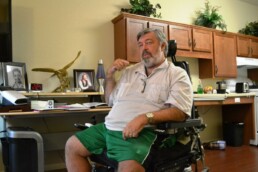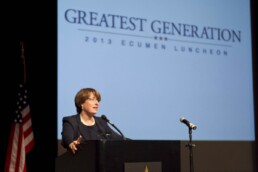Honoring Aunt Daisy
Every Wednesday at 9:30 a.m., Marie Fegley, a resident of Ecumen Lakeshore in Duluth, transforms herself into “Aunt Daisy” and spends the next hour transporting children to a world of make-believe.
It’s story time at Little Treasures Daycare in Duluth, and Marie, wearing a dust cap and apron, reads to the children and takes them to faraway places. Before retiring to Ecumen Lakeshore three years ago, the native New Zealander managed a bookstore out East, where she started a story time for children.
She continued her reading program at Little Treasures, which serves at-risk children. Ecumen teamed up with Little Treasures three years ago to create an inter-generational program to foster the healthy development of children and increase the quality of life of older adults. At the time, Little Treasures needed a permanent home, and Ecumen had some unfinished extra space at Lakeshore that was converted into the daycare center with donations from local civic organizations, individuals and foundations.
Marie was recently recognized for her work there by the Northlands NewsCenter in Duluth, which told her story in its regular “Making a Difference” segment. Click here to link to the television station’s video.
Thank you, Marie Fegley, for all that you do for the children of Little Treasures. We honor you.
Irene Carlson's Dream Come True
Irene Carlson had a musical, infectious laugh and a wonderful sense of humor. When she walked around Ecumen Parmly LifePointes in Chisago City for most of her life-- first as a volunteer then later as a resident-- her laugh warmed the halls. Both she and husband Wally were dedicated volunteers.
Irene loved rolling residents to their doctor’s appointments and doing their hair in the campus salon. Once her pastor came to the salon when she was volunteering, and she offered to do his hair. While she was shampooing him, he fell asleep in the chair. Irene woke him up, but not before she outfitted him in a hideous curly wig. He thought she had given him a perm. Irene laughed and laughed, and they’re still talking about that day so reminiscent of her fun-loving spirit.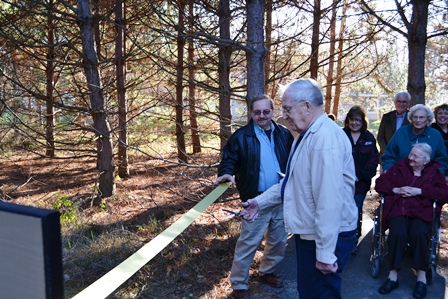
Irene and Wally, who ran the BP service station in Lindstrom, were known throughout the community for their generosity and community service. In fact, Wally was on the Parmly LifePointes board for 19 years. Their sons still run the service station.
About three years ago, Irene had some health problems and moved into Parmly LifePointes. And not long after, Wally followed. The day Wally moved in, Irene fell and broke her back. It was a long recovery, and during that time Irene loved going along the prayer walk outside the chapel, as she had done so many times before her injury. But the walkway was gravel and it was hard to maneuver her wheelchair.
Back in March of this year, she mentioned to Wally now nice it would be if the prayer walk were paved. It was so beautiful and calming and uplifting, weaving through the pines and stopping at the plaques and reading the Bible verses. She had walked it many times before her fall. How she wished she could use it now. Wally remembers that they talked about it several times.
But then in April, Irene died.
Wally talked to the kids, and they all decided Irene should have that paved prayer walk she dreamed about. Last Friday, November 15, 2013, the newly paved prayer walk was dedicated in Irene’s memory, thanks to the generous donation Wally made.
“This is a wonderful day,” Pastor Ron Gerls said at the ceremony. “Now this cathedral in the pines, this serene and holy place, is open to all, whether they are in wheelchairs or walking.”
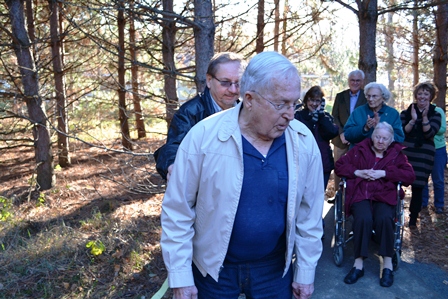 Wally cut the ribbon and led family, friends and staff along the path that Irene cherished. Several wheelchairs made the trip.
Wally cut the ribbon and led family, friends and staff along the path that Irene cherished. Several wheelchairs made the trip.
The path circles 300 yards through the dense pine trees and about halfway through is a bench dedicated to Irene. “There was no resting spot there, and this was where she liked to go,” Wally said.
After the ceremonial walk, the group gathered at a reception with cupcakes, punch and coffee. Wally, who is 92, decided that, on this very special occasion, he would go all-out and have a cup of coffee, even though his doctor would not approve. So Wally drank his coffee, ate his cupcake and remembered Irene and all the joy she brought him. He summed it up this way: “sixty-eight wonderful years of marriage, four children, nine grandchildren and 14 great grandchildren.”
Irene would enjoy this very much, he said. She would love this new prayer walk.
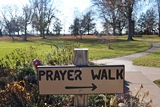
“I know she would,” Wally said.
About Ecumen Parmly LifePointes
Ecumen Parmly LifePointes is a nonprofit senior housing and community services campus located in Chisago City, Minnesota, just north of the Twin Cities, offering independent and assisted living, memory care, care center, rehabilitative, and innovative, holistic wellness services for vital aging. Gifts from friends, families, neighbors and area businesses will continue to impact and enhance the services and amenities provided. Thank you for support and commitment to Parmly’s Mission of “Service to Seniors.” To consider a gift for Parmly, click HERE, contact us at 651-257-7332, or email.
Honor: Ecumen Resident Kenny Nelson
 At Ecumen, we are very fortunate to work with people who have done so much for our country and communities.
At Ecumen, we are very fortunate to work with people who have done so much for our country and communities.
A Visit with the Man with 125 Kids
When Larry moved into his new home two years ago, he had a little trouble adjusting. It took him at least a couple of hours.
Larry Bauer-Scandin was just 64 when he rolled into Ecumen Seasons of Maplewood. The mysterious nervous system disorder afflicting him since childhood was beginning to seriously limit his mobility and keep him in constant pain.
So that first night, feeling a little down, he pulled his motorized chair over to a window, looked out and wondered: “Is this it?”
He pondered that question. And then he did what he’s done his entire life. He moved on. He’s a tolerant guy, but if there is one thing he cannot abide, it’s a “poor-me” attitude.
The next day he was ready to start this new chapter in his life. Time to settle in, hang some pictures, make himself at home. After all, as Larry puts it, “There’s always somebody who needs something.”
No doubt, Larry has had more misfortune than most. When he was lying in his hospital bed for more than four months at age 9, unable to move, he had a lot of time to watch and listen and think. It changed him forever. He was never the same after he heard that little girl down the hall shriek the night she died.
His journey over the next few years had a few false starts, but Larry found his way and his calling. He was not meant to be a priest. Seminary didn’t take. As it turned out, his calling was to help people that nobody else cared about—murderers, rapists, drug dealers, gangbangers. He was a parole officer, jail counselor and a juvenile officer. He started dealing with kids that nobody wanted, the really tough delinquent cases that the system had totally given up on. The hopeless cases.
But by then Larry had decided nothing was hopeless. He started taking in a few of these abandoned teenagers as a correctional foster parent. The number started to build when it became clear to the juvenile authorities that Larry would take most anybody without flinching and, more importantly, would have a considerable amount of success turning these young lives around. At one time, he was taking care of 17 teenagers at the same time, buying meat to feed them by the hundreds of pounds, filling four freezers and three refrigerators.
During that time, Larry saw it all. Like a kid whose mother sold him into prostitution on the street. Like a kid who got cocaine as a birthday present.
Today as Larry sits in his assisted living apartment at Ecumen Seasons of Maplewood he can look proudly at a full wall of his children’s photos hanging in his office. There have been about 125 in all. The oldest is 59, the youngest 33. Some pictures really stand out. There’s the Saint Paul cop. “Every time I hear about a shooting in Saint Paul,” Larry says, “I pick up the phone and call him to make sure he’s all right.” And there’s the Marine, and the soldier in the field in Afghanistan. “And this kid here,” Larry says, “I’m pretty sure he’s a millionaire. He came from wealth but is totally estranged from his real parents. But he’s built a very successful business from the ground up.”
And then, there are the kids who are dead, Larry says, choking up. He does that a lot. He’s a tough guy who thought nothing of walking on a prison floor to diffuse gang tension. But he’s an emotional guy who tears up when he thinks about his kids.
Make no mistake, they are his kids. They call him “Dad.” He is the only real dad most of them have ever known. About 20 of them still stay in very close touch, especially the ones who still live in the area. Larry wishes he could get them all together someday for a picture.
Once he was on the Today Show, and Katie Couric asked Larry the most important thing he had taught his kids. “How to hug,” he said.
So these days, two years into assisted living, Larry finds plenty to do. He’s just gotten a kitten named “Little Bit” to hang all over him. And he’s always on the lookout for someone who needs a little help—or maybe needs a little lecture about how to treat people. Maybe he’ll make sure this lady gets her hearing aid battery changed. Or maybe he’ll have a chat with this gentleman who has just yelled at a staff member for no good reason. Or maybe he’ll roll down to see Joe, the housing manager, about a few things around the place that are bugging him. A guy who’s raised 125 teenagers is not shy about speaking up.
Raising all those kids, he’s learned a few things about keeping order. He’s always watching what’s going on, what’s being said, what’s not being said. Intervening when necessary. Saying what he thinks needs to be said. Shocking people from time to time with his bluntness and the rude bumper stickers on the back of his motorized chair.
In 2010, Larry published his autobiography, “Faces on the Clock.” The title refers to the finite time everyone has on this earth and what we do with that time. He’s thinking he might write a sequel.
The illness that has brought Larry to assisted living is still not definitively diagnosed. He’s seen a lot of doctors over the years and gotten a lot of different opinions. But now he’s decided he just doesn’t care about that any more. It is what it is.
He recalls talking to a doctor recently who asked him if he was depressed. “No,” Larry said without hesitation. “Why would I be depressed?”
“Well,” the doctor said, “I think you’d be crazy not to be.”
But on the balance sheet of fortune and misfortune, Larry figures he’s come out ahead. After all, he’s got many hundreds of faces on his clock.
Kathryn Roberts Named Chair-Elect of LeadingAge Board of Directors
Kathryn Roberts, president and CEO of Ecumen, is the new chair-elect to the LeadingAge Board of Directors. LeadingAge is the national association of nonprofit aging services organizations.
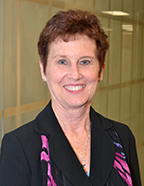 “Kathryn Roberts is a visionary leader who has created a culture of quality and innovation for Ecumen,” said LeadingAge President and CEO Larry Minnix. “LeadingAge is privileged to have her share her passion and expertise with our association as chair-elect.”
“Kathryn Roberts is a visionary leader who has created a culture of quality and innovation for Ecumen,” said LeadingAge President and CEO Larry Minnix. “LeadingAge is privileged to have her share her passion and expertise with our association as chair-elect.”
The LeadingAge Board of Directors is responsible for the governance of the organization, providing strategic direction, fiduciary oversight and development of policies. As chair-elect in 2014, and ultimately as Chair in 2015, Roberts will have the opportunity to help shape LeadingAge's work to transform the experience of aging in America.
Gayle Kvenvold, president and CEO of Aging Services of Minnesota said, “Kathryn is a leader in expanding the possibilities of aging, and will continue to bring her spirit of innovation, empowerment and collaboration to this new role.”
Roberts’ election marks the first time in association history that a member of Aging Services of Minnesota has been elected to this level of leadership position with its national association.
Julie Murray Promoted To Ecumen Vice President of Sales, Marketing and Business Development
Julie Murray has been promoted to the new role of vice president of sales, marketing and business development at Ecumen.
In announcing the promotion, Ecumen President and CEO Kathryn Roberts issued this announcement to Ecumen staff:
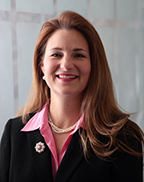 “This new position recognizes Julie’s combined leadership of three key areas: Ecumen’s sales and marketing efforts, real estate development and new business partnerships. Julie’s new job is effective immediately, and she will continue working closely with Steve Ordahl until his retirement in January 2014.
“This new position recognizes Julie’s combined leadership of three key areas: Ecumen’s sales and marketing efforts, real estate development and new business partnerships. Julie’s new job is effective immediately, and she will continue working closely with Steve Ordahl until his retirement in January 2014.
“Just over a year ago, Julie was named Ecumen’s vice president of sales, marketing and new ventures. In that time, Julie has assembled a talented team, including Matt McNeil, Diane Kenney and Tami Allenson to expand and support sales and marketing efforts across Ecumen. At the same time, the business development team has gained the skills of Dena Meyer, director of business development, and Kaili Braa, administrative assistant, and we are actively recruiting for an open director of business development position.
“Julie’s collaborative leadership has led to a new company-wide sales and marketing function this past year, featuring better training, tools and accountability. This approach has quickly improved our occupancy levels in both existing and new properties and identified new revenue streams based on innovative approaches to aging services. Julie also is exploring new partnerships that can help us expand our services in the Twin Cities and other markets.
“Julie has 15 years of senior housing experience that prepares her well for her new multifaceted role. She started at Ecumen in 2007 as director of real estate development and led the development of new Ecumen housing in Apple Valley and Maplewood, both winners of the Minneapolis St. Paul Business Journal's "Best in Real Estate" award for senior housing communities. Before that, Julie worked for Greystone Communities, Inc. in Dallas where she was responsible for the sales and marketing of multiple entry-fee continuing care retirement communities as a regional director of sales and marketing. Julie is a graduate of Texas Tech University where she received a Bachelor of Science degree in Restaurant, Hotel and Institutional Management.
“Please join me in congratulating Julie on this new role.”
Sen. Amy Klobuchar and Her Father Jim Salute Veterans at Ecumen Greatest Generation Event
“When veterans return home, we need to show them the dignity that they showed when they signed up,” U.S. Senator Amy Klobuchar told an audience attending Ecumen’s Greatest Generation Veterans Day luncheon at the Minnesota History Center Monday.
“There was no waiting in line when they signed up,” the senator said, “And there should never be a waiting line for jobs in the United States of America when they come back.”
Veterans understand that “duty, honor and sacrifice don’t end when the war ends,” she said, “and every generation needs to be reminded of this.”
Sen. Klobuchar, known for her legislation advocating for veterans, spoke to a group of nearly 120 Ecumen supporters who gathered for a special tribute to Greatest Generation, the generation that fought in World War II. About 30 members of the Greatest Generation were in the audience.
When veterans are on the battlefield together, Sen. Klobuchar said, they understand that they must put all their differences aside for the good of the nation. “We all could learn from veterans,” she said.
“How do you thank someone who has risked their life for you?” she asked. “We can’t thank them enough and can never truly repay them.” But through our actions every day, she said, we can show veterans the same commitment they showed us.
Sen. Klobuchar was introduced by her father, Jim Klobuchar, noted Minnesota journalist and blogger for Ecumen and Korean War veteran. He described growing up in an immigrant family on the Iron Range in the Great Depression when his parents worked 15 hours a day for low wages with the primary goal of making sure their children got a good education. “That is the story of how this country became great,” he said. “Now my daughter is a United States Senator.”
Ecumen President and CEO Kathryn Roberts paid tribute to the Greatest Generation “that took us from a bust economy to a boom economy… from a world terrorized by dictators to a world safe for democracy…from a land of discrimination to a land of opportunity.”
“We can all learn something about honor from this generation,” she said. “At Ecumen, we have gotten to know them well since most of our residents are members of the Greatest Generation. We are honored to now serve them, who served us so unselfishly.”
A Veterans Day Message From Ecumen CEO Kathryn Roberts
Millions of American military veterans have honored us with their service. Today, we set aside a special day to honor them and thank them for all they have done.
At Ecumen we care for many veterans and their loved ones, and we know firsthand the sacrifices they have made for all of us. Our promise is to honor them every day, but on this day of tribute, please say a special “thank you.” One way you can do that is to go to your Ecumen community’s Facebook page and share a thank-you or tribute.
Today at the Minnesota History Center, Ecumen will be hosting a program and luncheon to honor members of the “Greatest Generation.” Ecumen blogger Jim Klobuchar and his daughter U.S. Senator Amy Klobuchar will provide keynotes. Highlights will be tweeted during the event, and we’ll post more information online afterward.
The Greatest Generation is one in which almost everyone played a part in service to our country, either on the battlefronts of World War II or in support of the war effort at home. Then after the war, they focused on building the world’s strongest, most prosperous nation that we all benefit from today.
We can all learn something about honor and dignity from this Greatest Generation, who sacrificed so much to ensure that we who followed could be safe, free and successful. At Ecumen, we have gotten to know them well, since most of our residents are members of the Greatest Generation. We know what they are made of, and we are honored to now serve them, who served us so unselfishly.
Today, we thank all veterans everywhere for their service—an act of generosity that we can never repay. And a special thanks to all our residents and employees who are veterans, and their loved ones who are in active duty. We honor you today, and every day. Thank you so very much for all you did and do for us.
A Fitting Tribute to the Late Kenneth Paulson, Wounded Veteran
Kenneth Paulson of Hutchinson, Minn. returned from World War II missing his right hand and with shrapnel still in his legs. But he got right to work, raising his family and running his farm. Two months ago, a new flag and flagpole at Ecumen Oaks and Pines in Huchinson was dedicated in his honor, two years after his death. The story that follows is reprinted from the Hutchinson Leader.
Honoring heroes
By KAY JOHNSON johnson@hutchinsonleader.com
Family, friends and members of the Hutchinson Memorial Rifle Squad gathered Tuesday afternoon [Sept. 10, 2013] to dedicate a new flag and flagpole in honor of the late World War II veteran Kenneth Paulson. All veterans were recognized during the ceremony at Ecumen Oaks and Pines in Hutchinson.
“It was wonderful. Everything was wonderful. I can’t believe how well it went,” said Patricia Paulson, Kenneth’s wife. “I think Kenny would have been very proud. I know I am.”
“This is not only a fitting tribute to Kenneth from his family, but a wonderful gift to our entire Ecumen Oaks and Pines community,” said Kristal Ehrke, marketing manager. “It is a beautiful, patriotic symbol and we are so proud to fly the flag, which is visible to all who drive by and our residents living in both our buildings.”
“He was a proud vet,” said son Robert Paulson Sr.
Paulson served in the United States Army from Feb. 9, 1942 to Nov. 28, 1945.
Stationed in the South Pacific, he was part of the force that fought to take Mindanao, the second largest island in the Philippines, from the Japanese toward the end of the war in 1945.
About three months shy of Victory over Japan Day, Paulson was shot in the leg and went on to lose his right hand on May 11. He became a double Purple Heart recipient due to the wounds he received in combat.
“I was so glad he could talk about it,” she said.
Many vets suffer in silence keeping their war experiences to themselves.
“I remember my dad picking shrapnel out of his legs when I was 4 or 5,” Robert said.
Following his military service, Paulson returned to Minnesota. He and his future bride met at Bulldock’s Corner in Hutchinson. Patricia was there to see a girlfriend who worked there, when she looked over and saw this good-looking young man having a beer.
“It was love at first sight,” she said. “To me it was. He came to see me whenever he could. He was quite a guy. We did everything together.”
The couple married in 1948, making their living farming near Lake Marion.
Some might think losing a hand would put Paulson at a disadvantage, but Robert said not.
“I learned mechanics from my dad,” he said. “He could do anything. He was amazing. We did all our own repair work on the farm.”
Paulson’s hook came in handy because he could use it as a tool. Pat told the story of a salesman who stopped by the farm one day and was left open-mouthed when he saw Paulson shingling a roof and starting nails with his hook.
Robert remembers attending the first tractor pull at the McLeod County Fair. He was 14.
“Dad and I got picked to stand on the skid,” he said.
Robert eventually followed his dad into military service, choosing the Navy over the Army.
“My dad told me to go into the Navy. They had better food,” he said. “It made me.”
In 1977, the Paulsons headed to Florida where they lived until 2006.
“He loved it,” she said. “He could be outside. He was always busy.”
The couple returned to live in Hutchinson in 2006, when health problems and a desire to be closer to family brought them home.
“I’d forgotten what a beautiful town Hutchinson was,” she said.
Kenneth and Patricia shared 63 1/2 years of marriage, five children — Robert, Dianne, Barbara, Mark and Michael — nine grandchildren and 13 great-grandchildren.
Tuesday’s ceremony included a short story written by great-granddaughter Halee Kraft, and a solo of the national anthem by great-granddaughter Ashley Paulson. “The Battle Hymn of the Republic” was performed by the Ecumen Oaks and Pines Bell Choir.
Kenneth Paulson died on Sept. 10, 2010. Tuesday’s flag dedication marked the two-year observance of his death.
“First I was going to plant a tree, but it could die,” Patricia said. “This will always be there.”
Honoring Two Greatest Generation Vets: 70 Years Later
James and Virginia, both in their early 20s, were in the U.S. Army, two young Americans bonded by a common cause and fighting against a common enemy.
 They were two of the 16 million who served in World War II. They did not know each other then. James was in heavy combat, and Virginia was not far behind the lines as an Army nurse, caring for wounded soldiers.
They were two of the 16 million who served in World War II. They did not know each other then. James was in heavy combat, and Virginia was not far behind the lines as an Army nurse, caring for wounded soldiers.
Their paths would cross one day, but not until 70 years later. They are now both living at Ecumen Pathstone Living in Mankato. James is 95. Virginia is 91.
They are proud of their service. But, like so many members of the Greatest Generation, they are also modest.
James changes the subject when he’s asked about his war experience.
And Virginia simply says, “This was a very important part of my life. I can’t say enough about how great all the GIs were.”
Virginia met an infantry officer in Europe who she would later marry back in the States. She continued in nursing, and he became a college president.
James and his wife have lived at Ecumen Pathstone Living for three years now.
Both Virginia and James appreciated that they were guests on Honor Flights in 2011. Virginia flew out from Kansas City and James from Rochester, Minn., on the whirlwind one-day flight to Washington, D.C. to visit the World War II War Memorial.
While on the flight, they received “mail call” which included letters from children (classrooms wrote letters), also some family, as well as a card from staff at Pathstone Living. When they landed, they were escorted to the WWII memorial by police cars. Then they were greeted by supporters who held posters and cheered when they returned.
On Veterans Day, Ecumen communities will be honoring veterans like Virginia and James and all our veterans who have served. We cannot honor them enough.



